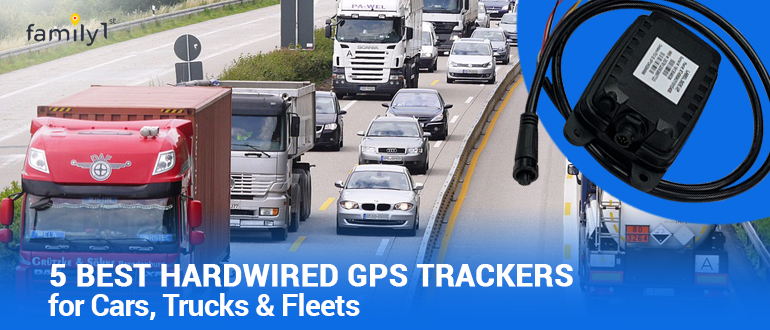Key Takeaways
- Bluetooth trackers help find nearby lost items like keys and wallets, but they don’t work for real-time tracking.
- GPS trackers provide live tracking for vehicles, pets, and people, making them ideal for long-distance monitoring.
- Bluetooth trackers are affordable with long battery life, while GPS trackers require a subscription and frequent charging.
- For vehicle tracking with real-time updates, the Family1st Plug-in GPS Tracker offers geofencing, engine diagnostics, and driver safety alerts.
Table of Contents
What is a bluetooth tracker?
Bluetooth tracker is a small device that helps you find lost items by connecting to your phone through Bluetooth. It works within a short distance, usually between 30 to 400 feet, depending on the model.
If the tracker goes out of range, it uses a crowdsourced network to help update its last known location. Many Bluetooth trackers also have a built-in speaker, so you can make them ring to find your lost item quickly.
How Bluetooth Trackers Work
- Pairing with a Smartphone – The tracker connects to a smartphone via Bluetooth through a companion app. Once paired, it remains linked within its operating range.
- Detecting Nearby Items – The tracker continuously sends signals to the phone, allowing users to check its last known location. A built-in speaker lets users ring the tracker to find misplaced items quickly.
- Range Limitations – Walls, furniture, and electronic interference can weaken the Bluetooth signal, reducing the effective tracking distance. Open spaces provide better connectivity and improve tracking accuracy.
- Crowdsourced Location Tracking – If the tracker moves out of range, it depends on a shared tracking network. Other users with the same app can unknowingly update the lost item’s location when they pass nearby.
- Battery & Power Management – Most trackers run on replaceable coin cell batteries, lasting several months to years. Some models use rechargeable batteries that require periodic charging.
- Smartphone Integration – Many trackers support smart alerts, notifying users when they leave an item behind. Some also work with voice assistants, enabling hands-free item location.
Advantages and Disadvantages of Bluetooth Trackers
Advantages
✅ No fees – No subscription required.
✅ Long battery – Lasts 1–2 years.
✅ Easy setup – Quick phone pairing.
✅ Lightweight – Fits small items.
Disadvantages
❌ Short range – Works within 30–400 feet.
❌ No live tracking – Shows last location only.
❌ Unreliable recovery – Depends on other users.
What is a GPS Tracker?
A GPS tracker is a device that uses the Global Positioning System (GPS) to determine the exact location of an object in real-time. It connects to satellites, allowing it to provide accurate positioning across vast distances. Most GPS trackers come with cellular connectivity, enabling them to transmit location data to an app or platform.
How GPS Trackers Work
- The GPS tracker receives signals from multiple satellites.
- It calculates the object’s location using triangulation.
- The device sends the location data via cellular networks (4G, 5G, or LTE) to an app or online platform.
- The user can monitor movement in real-time through a smartphone or computer.
Read more: How do GPS Tracking Devices Work
Advantages and Disadvantages of GPS Trackers
Advantages
✅ Real-time tracking – Continuously updates location.
✅ Long-range – Works globally with network access.
✅ Geo-fencing – Sends entry/exit alerts.
✅ History logs – Tracks movement over time.
Disadvantages
❌ Requires data – Needs SIM card and subscription.
❌ High battery use – Requires frequent charging.
❌ Signal issues – Weak in tunnels or low coverage areas.
Key Differences Between GPS and Bluetooth Trackers
| Feature | GPS Tracker | Bluetooth Tracker |
|---|---|---|
| Tracking Range | Global (with network) | Limited to 30–400 feet |
| Real-Time Tracking | Yes | No |
| Connectivity | Uses satellites & cellular networks | Uses Bluetooth |
| Battery Life | Shorter (days to weeks) | Longer (months to years) |
| Subscription Fees | Yes, requires cellular plan | No |
| Best For | Vehicles, pets, people, valuables | Keys, wallets, small items |
| Offline Tracking | No, requires network access | Yes, but limited |
| Accuracy | High (precise GPS coordinates) | Low (last known location) |
Family1st Plug-in GPS Tracker
![]()
Family1st Plug-in GPS Tracker is a simple and effective way to track your vehicle in real-time. It connects to your car’s OBD port, providing instant location updates and vehicle performance insights.
With geofencing alerts and driver safety reports, you can monitor speeding, hard braking, and more. Plus, it offers engine diagnostics and notifications, keeping you informed about your car’s health at all times.
Conclusion
If you’re looking for a real-time location tracker for a car, pet, or even a loved one, a GPS tracker is the way to go. It provides accurate tracking anywhere, but keep in mind it needs cellular data and frequent charging.
On the other hand, if you often misplace keys, wallets, or backpacks, a Bluetooth tracker is a simple and budget-friendly option. It works well for nearby tracking, but it won’t help if the item is far away. Pick the one that fits your needs and lifestyle best!








Next
Previous